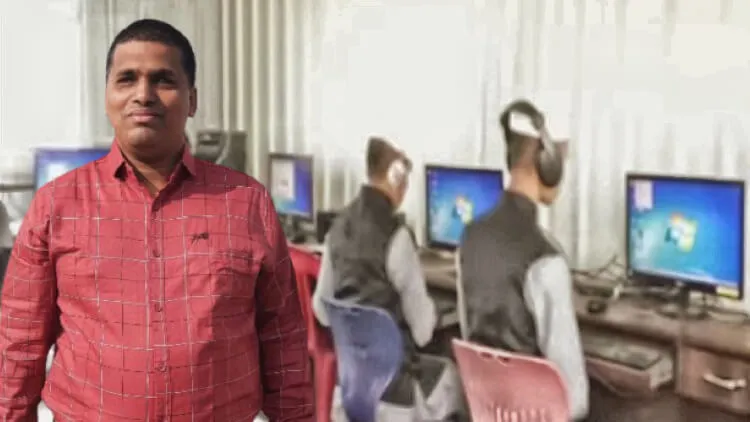
Shah Taj/Pune
Abdul Aziz has turned his physical limits into an asset to connect with and help students who, like him, are visually challenged. He has been teaching English and computers to students of a private blind school in Pune for years. On the occasion of Teachers’ Day, Shah Awaz-the voice spoke with him on his experience and mission. Excerpts from the Interview:
Why did you choose to be a teacher? Did you ever think of becoming something other than a teacher?
I never wanted to be a teacher. While I was doing my BA, I was also doing a computer programming course. At that time one of my teachers asked me to teach computers to a special child. I had to go to that child's house to teach him computers. I wondered if I could do this and asked my teacher if I could do it. "I'm sure you can handle that," he said.
I started teaching that child. Gradually I got a chance to teach many children and I started enjoying teaching. I did a lot of work after completing my education but I was not feeling well. Then I realized that teaching is the most suitable for me and then I tried in this direction and now I am both satisfied and happy.
Have you ever taught normal children?
It never happened. I have always taught English and computers to blind children.
Is there any special procedure for teaching special children (blind)?
The way a normal teacher keeps both his eyes open in the classroom, he keeps an eye on the children. In the same way, we keep our ears open. We use our hearing to monitor each child. It used to be a little difficult but now it is easy.
Did you undergo a training course for teaching the blind?
Training of everything is not possible. From my experiences, I have created the ability in myself that even if there are seven children in the class, I can keep an eye on each child or in other words, keep an ear.
How do you compare the job of a regular teacher and that of a special teacher for blind children?
In my opinion, a special teacher like me is better for special children because he is aware of their problems.
Why an ordinary teacher is not the right person to teach them?
It is not so. 70 to 80% of the teachers in every school are ordinary teachers. But it has been generally observed that children are more inclined towards a special teacher like themselves.
How do you teach children about colours?
Special needs people like me are bereft of one of the five senses. We can’t touch, smell, hear or taste the colors, nor can we taste them. But we must teach children about colors. We tell them that there is such a thing as color in the world. Like science formulas, we also remind them of colors.
What could be a better profession for a blind person?
There are many opportunities for blind people today. But no task is easy. If I know that I am blind, I know that I have to become a software engineer, then I also know that I work 100 times harder than others. I have to work. If I work hard, no one and nothing, including my blindness, can stop me from becoming a software engineer.
You make children feel the world. What do you emphasize the most?
I tell them that if you don't get an education, you won't live anywhere. I try to be something, trust myself and grow. Don't think of yourself as less than anyone. My whole focus is on getting them to their feet, without any support.
There are a lot of opportunities in government jobs nowadays. Would you like to change your profession?
No, not at all. Being a madrassa is my identity. When my students reach a place, I cannot express the happiness that I feel at that time. This peace, this satisfaction has been given to me by this work.
Do you message do you want to give to the people?
I want to ask the parents of special children to let their special children come out. Help them stand on their own two feet and tell the special children that if they want to do something, they can do it. Sometimes we don't get a built road, we have to build our own road to take our next step. Someone must have worked hard and very hard to build the road that you and I have got today. Now it is our turn to create facilities for those who come after us and thus fulfill our responsibility.
